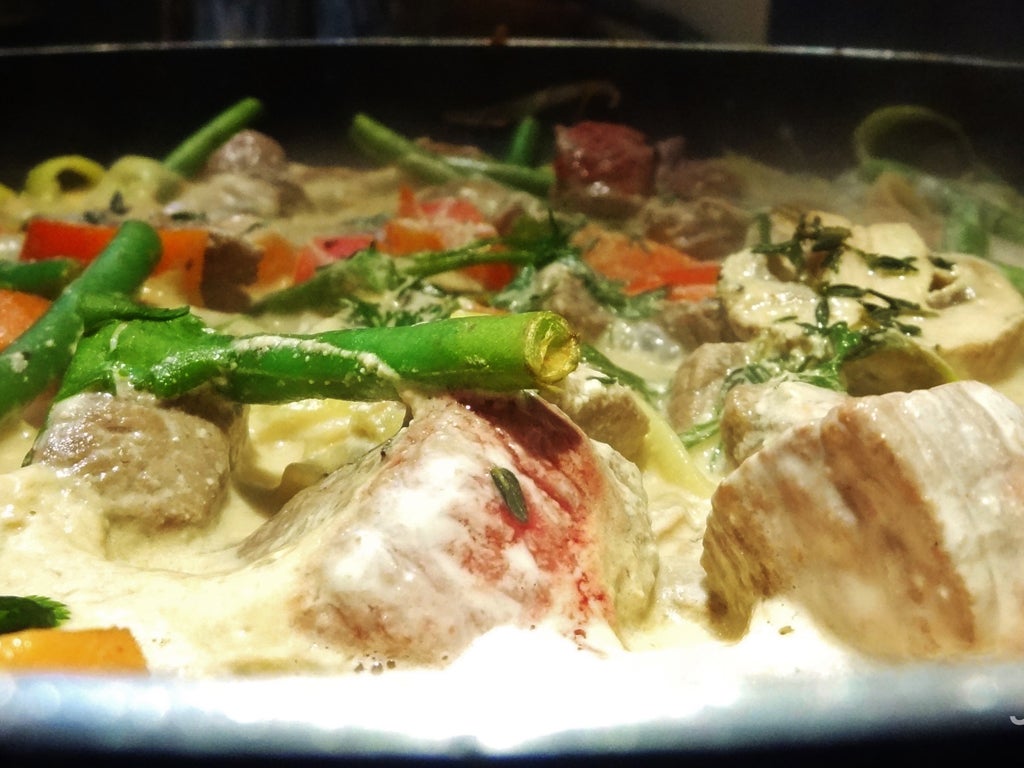Be your own student Masterchef: Cooking delicious food with simple ingredients
No matter what anyone might say, cooking for yourself doesn't have to mean beans on toast. Student gastronome Joe McMullan has a few basic lessons for those of you who aspire to greater meals

In this day and age it’s hard not to feel like everyone should be a ‘Masterchef’, but have you have ever succeeded in recreating one of these televised mouth-watering masterpieces?
However many times TV chefs use the words ‘simple’, ‘bang’ and ‘done’, it doesn’t make it any less of a challenge. What you saw probably took 10 takes, thousands of pounds in high-end cooking apparatus and a larder the size of Sainsbury’s.
Despite all this you can still impress with minimal effort, preparation and money. Forget long, complicated recipes, mountains of washing up and angry last-minute encounters with self-checkouts. All you need in your kitchen is meat, vegetables, dry herbs, salt, pasta and rice. Any extras you have knocking around the shelves only improve things, there’s no need to go out questing for lemongrass or obscure Nicaraguan poppies. You make the meal; it doesn’t make you.
So here are a few thematic suggestions for new culinary adventure:
The 'medieval'
Remember that time when people killed each other all day? They must have eaten damn well; how else had they the energy to wander around wearing a giant iron onesie all day? And that’s aside from all the ransacking and pillaging. So eat like a knight and use a knife, a pot and a fire. Cook with water for soup or butter for frying. The smaller the cut of vegetable and meat the faster they cook, so throw anything you have in and season with salt plus any green herbs you have. Serve in a bowl, or if fried, get creative and put it all in giant Yorkshire pudding with gravy.
Tips:
- Butter has a lower burning point than oil, so only use with fatty meats with their own oils, and be careful of anything that requires a long time to cook to avoid burnt outsides.
- Stock is an excellent substitute for salt and full of extra flavour. If not used in soup it will need to be dissolved in some oil or water and mixed in.
The 'Mediterranean'
Instantly classy, it always tastes and sounds amazing. Forget the multitude of fancy, overcomplicated, Italian-sounding dishes; in essence this is pasta and tomato. All it takes is enough of the right flavours and you’ve created a mouth-watering culinary orgasm.
Boil your pasta and dice whatever meat you have, and throw it into a pan with olive oil. When the meat is half-cooked, add colourful vegetables, as well as tinned tomatoes, garlic, and any green herbs you have. Basil is the most commonly used, but smell your herbs and trust your nose when deciding what to add. For a final flourish, add red wine to taste and allow the sauce to reduce down to a less runny state.
Tips:
- Red wine should be added carefully, as too much can ruin a dish.
- Garlic, basil, coriander and thyme are the most useful seasonings.
- Baby leaf salad or spinach enhances the meal, as a side or mixed into the cooking.
- Put the pasta on the plate before adding the sauce, this stops any dilution of flavour.
The 'Modern'
The simplest way to attempt a modern dish is by bringing together cultures, mixing ingredients which would never have seen each other until the rise of trade and travel. This allows you to be more creative with your dishes and cook something much more unique. Use rice as the base for these dishes. Add your meat to a pan with oil or butter, and when the meat is half cooked, add vegetables, herbs and sour cream. Chives or spring onion often work very well.
Tips:
- Be careful to drain the rice when cooked, rather than let it sit until the rest is finished or you will be left with mushy, watery mess rather than rice.
- Greek or natural unflavoured yogurt can be used as substitutes for sour cream.
- With curry powders in place of herbs this can be converted to an Indian style dish very easily. Turmeric, all spice, paprika, gram masala and cumin are all common.
Do it well, on the cheap
I said at the beginning of this that you need not be rich to eat well, and I hope I convinced you of that. Estimated costs for the basics:
- £0.70 Herbs
- £1.20 Vegetables
- £3.00 Meat
- £2.00 Butter/ Oil
- £1.00 Sour cream, yogurt for sauce.
Bear in mind these will last for more than one meal and can be frozen, so on average a decent meal should cost you around £2.60, less than the bottle of wine you'll want to celebrate your culinary success.
Joe McMullan is a student of culture, good food and literature, studying at Bath Spa. Red his blog here.
Join our commenting forum
Join thought-provoking conversations, follow other Independent readers and see their replies
Comments
Bookmark popover
Removed from bookmarks